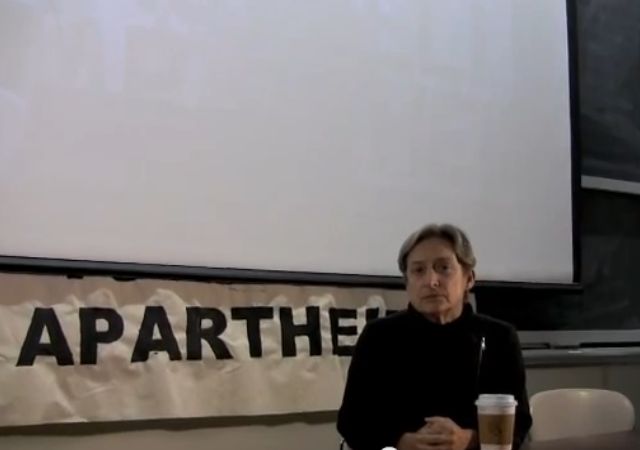Anti-Israel academic boycotters reaping counter-boycott they sowed

Judith Butler is an intellectual leader of the anti-Israel academic boycott movement.
Butler relentlessly seeks to delegitimize Zionism and Israel in the most crude terms, wrapped in an intellectual blanket.
Butler has no hesitation boycotting Israeli academics under the guise of boycotting academic institutions. As if boycotting Israel universities and programs is not also boycotting the individuals who work at those institutions and participate in those programs.
Butler and other boycotters think they have come up with a reverse neutron bomb — destroying the institutions but not the individuals in the institutions. But they are wrong. They are hurting individuals and the academic community as a whole.
Butler and the academic boycotters are also part of a BDS movement conceived at the anti-Semitic 2001 Durban NGO conference and which at its core is simply the latest in a century of anti-Jewish boycotts directed at Jews and only Jews in the region.
After the American Studies Association anti-Israel boycott, for which Butler actively advocated, there is something of a counter-boycott growing.
Butler is a subject of that growing movement, recently withdrawing from a Jewish Museum event after protests at her invitation.
That’s one of the problems with academic boycotts — they are easy to start, but hard to contain. If Butler can boycott Israeli academics, then why can’t pro-Israel academics, students and supporters boycott Butler?
The inevitability of a counter-boycott, including legislation, was easily forseeable. That was one of the reasons so many university presidents — over 250 so far — came out against the ASA anti-Israel academic boycott.
Now Butler is complaining that the counter-boycott movement is illegitimate and an affront to academic freedom and free speech, as reported by Inside Higher Ed:
Noted scholars Judith Butler and Rashid Khalidi jointly wrote a statement, signed by about 150 other academics and artists, condemning the intimidation and censorship of individuals who support the boycott, divestment and sanctions (BDS) movement against Israel.“Whether one is for or against Boycott, Divestment and Sanctions (BDS) as a means to change the current situation in Palestine-Israel, it is important to recognize that boycotts are internationally affirmed and constitutionally protected forms of political expression,” the Butler-Khalidi statement reads. “As non-violent instruments to effect political change, boycotts cannot be outlawed without trampling on a constitutionally protected right to political speech. Those who support boycotts ought not to become subject to retaliation, surveillance, or censorship when they choose to express their political viewpoint, no matter how offensive that may be to those who disagree.”The statement continues: “We are now witnessing accelerating efforts to curtail speech, to exercise censorship, and to carry out retaliatory action against individuals on the basis of their political views or associations, notably support for BDS. We ask cultural and educational institutions to have the courage and the principle to stand for, and safeguard, the very principles of free expression and the free exchange of ideas that make those institutions possible….”
Sorry Butler, if academic boycotts are legitimate forms of speech and expression, then so too are academic counter-boycotts. You can’t have it both ways.
Butler has no standing to complain. She started the academic boycott war, and now it’s not going the way she hoped.
I remain against academic boycotts, but I have no sympathy for and will not jump to the defense of those who started the war the rest of us tried to prevent.
(Featured image: YouTube video)
CLICK HERE FOR FULL VERSION OF THIS STORY